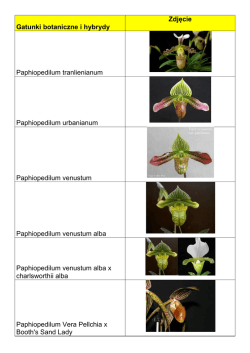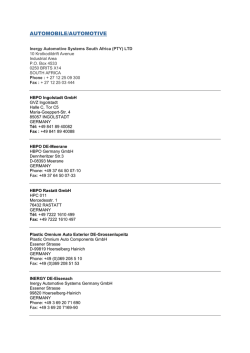
Rhynchostylis retusa (L.) Blume - Foxtail Orchid
PLANT OF THE WEEK 10 TH WEEK 2-2-2015 Rhynchostylis retusa (L.) Blume - Foxtail Orchid Botanical Name : Rhynchostylis retusa (L.) Uses Blume Synonyms (s): This is an ornamental orchid, having horticultural value & known as ‘Rhy’ in horticultural trade. Aerides retusa (L.) Sw. Epidendrum retusum L. Whole Plant: The plant paste is applied for wounds, cuts and bruises. Various preparations of this plant are also taken to cure asthma, tuberculosis, epilepsy, vertigo, palpitation, kidney stone, menstrual disorders & rheumatism. Limodorum retusum (L.) Sw. Orchis lanigera Blanco. Saccolabium rheedii Wight. Saccolabium retusum (L.) Voigt. Leaf: Traditionally the fresh young leaves are used to treat rheumatic disease, ear pain, blood dysentery, skin diseases and external inflammations. Family: Orchidaceae Local Name Hindi: Draupadi Mala Root: Aerial root juice mixed with leaf paste is used for ear pain & cleaning. It is also use to cure emollient as well as throat inflammation. Assamese: Kopou Phul Konkani: Panas Koli Manipuri: Samijirei Marathi: Seetechi Veni Telugu: Chintaranamu Foxtail Orchid in Blooming Habit & Habitat Rhynchostylis retusa is an epiphytic herb; commonly found in open forest and also found in forest margin. Distribution India , Andaman Island, Bangladesh, Nepal, Bhutan, Myanmar, Sri Lanka, Malaysia, Philippines, Thailand, Cambodia, Indonesia, Singapore, Java, Sumatra &Vietnam. Flowering Time: May-June Fruiting Time: July-December Conservation Status Endangered Rhynchostylis retusa Ethnobotany Rhynchostylis retusa (L.) Blume is considered as state flower of Assam. Inflorescence of this species has been used by Assamese girls to adorn their hair during the spring festival ‘Rongali Bihu’. Among the youths of Assam, this orchid is regarded as symbol of love, fertility and merriment. It is used in marriage ceremony of the Assamese & also is an integral part of a Bihu dancer's attire. Considering its importance the native of Assam grow this species in their home premises. Description Stem: Ascending, enclosed in leaf sheaths. Leaf: Leaves alternate, distichous, close-set, curved, broadly lorate, keeled, thickly coriaceous, praemorse or bluntly bilobed and sharply pointed at tip, sheathing and articulate at base. Flower: Inflorescence 1-3, pendulous, 30-40 cm. Densely many flowered, rachis thick, floral bracts reflexed, broadly ovate. Bracts small, membranous, persistent. Pedicel with ovary. Flowers medium-sized Sepals & petals white and spotted with pink or pale purple, lip purplish pink. Sepal unequal, 3-vained; dorsal oblong -ovate, obtuse. Petal ovate, obtuse, tapered at base. Column equally broad, dilated and capitate, incompletely winged above. Stigma deepseated, rostellum conspicuously projected upward & backward horn like . Source Saxsena, H.O. & Brahmam, M. (1994). Flora of Orissa, Vol.III, pp:1869-1870. Mishra, S. (2004). Orchids of Orissa, pp: 639-643. Amin, M. Al., Sultana, GNN., Hos ain, CF. (2011). Analgesic and antiinflammatory activities of Rhynchostylis retusa. Radhika, B.,Murthy, JVVSN., Nirmala Grace, D. (2013). Antifungal and Cytotoxic activities of medicinal important orchid Rhynchostylis retusa Blume. www.en.wikipedia.org/wiki/ rhynchostylis_retusa. www. googleimage.com
© Copyright 2026

